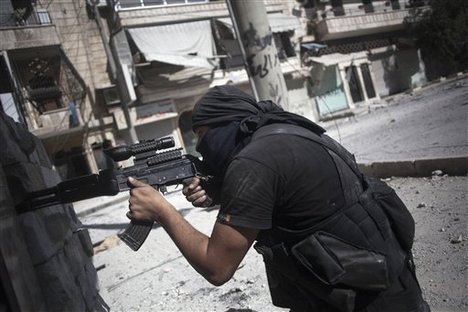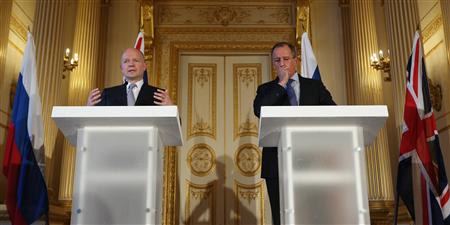- Beranda
- Komunitas
- News
- Berita Luar Negeri
Barat Tolak Pasok Senjata untuk Oposisi Suriah karena Takut Jatuh ke Tangan MujahidiN
TS
pria.pendiam
Barat Tolak Pasok Senjata untuk Oposisi Suriah karena Takut Jatuh ke Tangan MujahidiN

Quote:
berita pendukung lain :
West tiptoes into Syrian war hoping to boost more secular rebels

LONDON (Reuters) - France, Britain and the United States are inching towards providing military aid to Syria's rebels, hoping to beef up more secular forces at the expense of radical Islamists who are gaining ever more prominence in the uprising.
The bitter experience of Afghanistan, where the American arming of anti-Soviet mujahideen forces in the 1980s helped to give rise to the Taliban and al Qaeda, hangs heavy in the air.
And as in Libya, the leaders of Britain and France seem keener than U.S. President Barack Obama to get more involved.
But with Saudi Arabia and Qatar already openly arming the Syrian rebels, Britain and France - both committed with Washington to seeing President Bashar al-Assad leave - want at least to make sure that weapons go to the "right" groups and are not so advanced that they could pose a threat to the West.
They believe they are now in a position to do so - two years after the outbreak of an uprising that has escalated into civil war, with around 70,000 people dead and one million homeless.
"The well-known arguments against arming the rebels - finding a political situation first, not militarizing the situation or having weapons falling into the wrong hands - are losing their impact," a senior Western diplomat said.
"We have now identified where the weapons can go and who will get them. The pressure on Bashar is not working and we can't allow one side to continue to get assassinated."
In the last two weeks, Britain and the United States have announced a significant increase in "non-lethal" support to the insurgents. Both have also become much more publicly supportive of efforts by Saudi Arabia and Qatar to arm the rebels.
France said on Thursday it would work with Britain to convince fellow European Union members to relax an embargo on providing arms to Syria. Prime Minister David Cameron said on Tuesday that Britain might be prepared to bypass the embargo.
Backing the rebels is increasingly seen as almost the only leverage foreign powers have. Unless more moderate forces are armed, Islamists with superior equipment and training thanks to Saudi and Qatari support may well grow ever more powerful.
"It may be (that) by doing nothing, the situation gets worse and the level of jihadism gets worse," Cameron told a parliamentary committee this week. "By working with the opposition, by supplying parts of the opposition ... you can at least have influence with your partners."
DIFFICULT CHOICE
Ashfon Ostovar, regional analyst at the Centre for Naval Analyses, a U.S.-government funded think-tank that advises the U.S. military among other clients, said: "The bottom line is that they (the rebels) are getting weapons.
"It's a very difficult choice ... but if we don't supply, someone else will."
Many diplomats and analysts fear that the longer Syria's war goes on, the greater the threat of a major Arab state at the heart of Middle East conflicts fragmenting into armed chaos, endangering its neighbors.
British officials say that Britain, and therefore France too, is unlikely to act without the backing of the United States, which has so far been more cautious.
But Washington insiders say the arrival of Secretary of State John Kerry - who as chairman of the Senate Foreign Relations Committee argued last year that Washington should arm rebel forces - subtly shifted that dynamic.
"In almost every institution - the State Department, Pentagon, CIA, as well as the think-tanks, the newspapers - people think the U.S. should be doing more," says Ari Ratner, a former Obama Administration State Department political appointee and now a fellow at the Truman National Security Project.
"The problem is that no one can really agree what should be done, because there are no easy options."
Ultimately, few believe that medical supplies, radios, body armor or even armored, four-wheel drive vehicles will significantly tilt the war against Assad. Nor have the arms supplied by Gulf countries produced a breakthrough.
The German weekly Der Spiegel and Britain's Guardian said U.S., British and French instructors are training Syrian anti-government fighters in Jordan with the help of Jordanian intelligence services, aiming to build a dozen units totaling 10,000 fighters, but excluding radical Islamists.
European security officials have played down those reports. But, as well as groaning under the strain of 300,000 Syrian refugees, Jordan can see Islamist militancy rising on its doorstep and is more worried than Saudi Arabia or Qatar.
Late last year, the United States listed Jabhat al-Nusra, one of the most successful Islamist rebel groups fighting in Syria, as a banned terrorist organization.
"The Jordanian intelligence services want to prevent Salafists (radical Islamists) crossing from their own country into Syria and then returning later to stir up trouble in Jordan itself," one of the organizers of the training told Der Spiegel.
BERSIAP TEGAKNYA KHILAFAH
revolusi suriah=revolusi islam

0
1.6K
11
Guest
Tulis komentar menarik atau mention replykgpt untuk ngobrol seru
Urutan
Terbaru
Terlama
Guest
Tulis komentar menarik atau mention replykgpt untuk ngobrol seru
Komunitas Pilihan